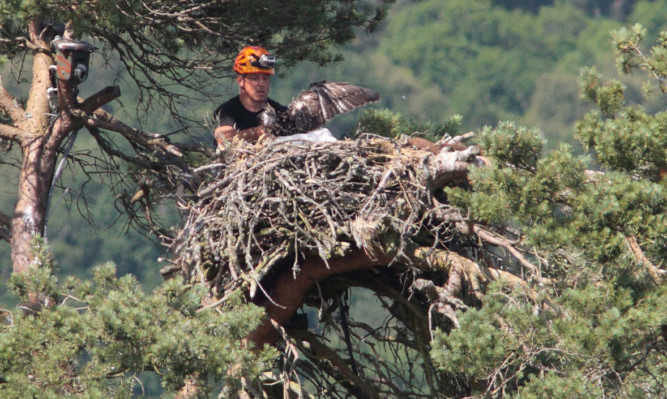Experts are hoping for a happier ending after tagging their second chick at Loch of the Lowes.
Following the loss of Blue 44 last year, it is hoped that these latest efforts to follow osprey migration will be more successful.
The 50th chick to hatch at the Dunkeld reserve is just weeks away from taking to the skies and will play a key role in uncovering the mystery of where the raptors spend their early years.
As part of the satellite tagging process, which costs around £3500, the young osprey was also ringed on Monday and will now officially be known as Blue YZ.
Ranger Emma Rawling revealed the six-week-old chick is a female and is taking after its record-breaking mother Lady.
She told The Courier: “Hopefully, like her brother last year, we will be able to follow what happens for good or bad.
“She should migrate this autumn and once she gets to Africa, the osprey will remain there for a gap year.
“There is so much we can learn between now and when she returns to the UK in two to three years.
“Even if something does go wrong, we can find out where or why it happened, rather than it remaining a complete mystery.”
Only 50% of osprey chicks make it through the first two years, as they face a number of challenges during migration, including predation and finding food.
Despite being fitted with a satellite tag last year, Blue 44 disappeared off the radar while flying through Spain.
Although staff and volunteers at the Scottish Wildlife Trust are hopeful the equipment malfunctioned, there is a significant chance that he didn’t survive the migratory journey.
Osprey fans will be able to enjoy the antics of Blue YZ for several more weeks, as the young female isn’t expected to leave her Perthshire nest until the end of August.
Until then, the chick will be learning how to fly and hunt.
Ms Rawling added: “Both parents have done a fabulous job so far and will keep looking after the chick until she can fly for herself.
“She certainly seems to be taking after her mother and is pretty bossy, as well as being very strong.
“Hopefully she will take after her with her longevity as well.”
The young osprey has some way to go as, at the age of around 28 years, Lady holds the title of the UK’s oldest breeding osprey.
Photo by Phil Hannah
